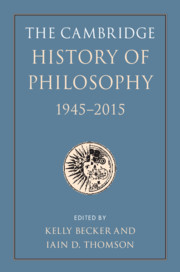Book contents
- The Cambridge History of Philosophy, 1945–2015
- The Cambridge History of Philosophy, 1945–2015
- Copyright page
- Contents
- Contributors
- Preface and Acknowledgments
- Introduction
- Part I Analytic Philosophy
- Section One Language, Mind, Epistemology
- Section Two Logic, Metaphysics, Science
- Section Three Analytic Moral, Social, and Political Philosophy
- 16 The Revival of Virtue Ethics
- 17 Kantian Ethics
- 18 Consequentialism and Its Critics
- 19 The Rediscovery of Metanormativity
- 20 Constitutivism
- 21 John Rawls’s Political Liberalism
- 22 The Twilight of the Liberal Social Contract
- 23 Feminist Philosophy and Real Politics
- Section Four Analytic Aesthetics and Philosophy of Religion
- Part II Continental Philosophy
- Part III Bridge Builders, Border Crossers, Synthesizers, and Comparative Philosophy
- Part IV Epilogue: On the Philosophy of the History of Philosophy
- References
- Index
16 - The Revival of Virtue Ethics
from Section Three - Analytic Moral, Social, and Political Philosophy
Published online by Cambridge University Press: 08 November 2019
- The Cambridge History of Philosophy, 1945–2015
- The Cambridge History of Philosophy, 1945–2015
- Copyright page
- Contents
- Contributors
- Preface and Acknowledgments
- Introduction
- Part I Analytic Philosophy
- Section One Language, Mind, Epistemology
- Section Two Logic, Metaphysics, Science
- Section Three Analytic Moral, Social, and Political Philosophy
- 16 The Revival of Virtue Ethics
- 17 Kantian Ethics
- 18 Consequentialism and Its Critics
- 19 The Rediscovery of Metanormativity
- 20 Constitutivism
- 21 John Rawls’s Political Liberalism
- 22 The Twilight of the Liberal Social Contract
- 23 Feminist Philosophy and Real Politics
- Section Four Analytic Aesthetics and Philosophy of Religion
- Part II Continental Philosophy
- Part III Bridge Builders, Border Crossers, Synthesizers, and Comparative Philosophy
- Part IV Epilogue: On the Philosophy of the History of Philosophy
- References
- Index
Summary
In the second half of the twentieth century, an influential strain of ethical thinking conceptualized itself as a revival of an ancient ethical tradition, as against modern moral philosophy, and in particular as a recovery of two central ethical concepts: virtue and eudaimonia. This revival paved the way for virtue ethics to be regarded as one of the “big three” approaches in ethics, alongside deontological and consequentialist approaches. Early developments of virtue ethics were eudaimonist, harking back to ancient Greek philosophers, especially Aristotle. Now, virtue ethics is understood as a genus, eudaimonist virtue ethics being only one species (Swanton 2003: 1), and virtue has become an important concept for other approaches in ethics, and in other areas of philosophy, such as epistemology. In this chapter, we provide a sketch of this revival, beginning with the features of modern moral philosophy, discontent with which provided the impetus for the revival, and concluding with some speculations about future developments of virtue ethics and the concept of virtue.
- Type
- Chapter
- Information
- The Cambridge History of Philosophy, 1945–2015 , pp. 223 - 236Publisher: Cambridge University PressPrint publication year: 2019
- 1
- Cited by

